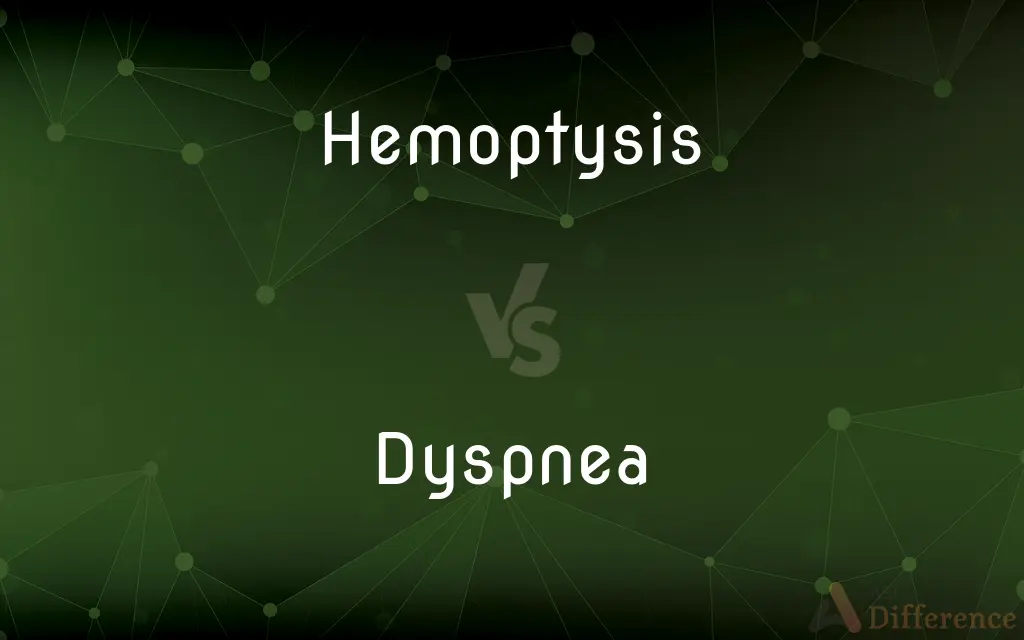Hemoptysis vs. Dyspnea — What's the Difference?
By Urooj Arif & Fiza Rafique — Updated on May 7, 2024
Hemoptysis involves coughing up blood from the respiratory tract, indicating potential lung or airway disease; dyspnea, or breathlessness, reflects difficulty breathing, often symptomatic of cardiovascular or pulmonary conditions.

Difference Between Hemoptysis and Dyspnea
Table of Contents
ADVERTISEMENT
Key Differences
Hemoptysis often alarms patients due to its dramatic and noticeable symptomatology. In contrast, dyspnea may gradually increase in severity, making it less immediately alarming but potentially more debilitating over time.
The diagnostic processes for hemoptysis and dyspnea also differ; hemoptysis usually leads to investigations focusing on the respiratory tract such as chest X-rays and bronchoscopy. On the other hand, dyspnea might require broader diagnostic approaches including pulmonary function tests and echocardiography to assess both lung and heart function.
Treatment approaches for hemoptysis can involve addressing the underlying cause, like antibiotics for an infection or surgery for lung cancer. Conversely, treatment for dyspnea depends on its root cause; it may include inhalers for asthma, medications for heart failure, or supplemental oxygen.
Comparison Chart
Definition
Coughing up blood from the lower respiratory tract
Difficulty in breathing or shortness of breath
Common Causes
Infections, cancer, chronic lung diseases
Heart failure, asthma, pulmonary conditions
ADVERTISEMENT
Diagnostic Tests
Chest X-ray, CT scan, bronchoscopy
Spirometry, chest X-ray, cardiac evaluation
Treatment
Depends on underlying cause (e.g., antibiotics, surgery)
Treatment of underlying condition (e.g., inhalers, oxygen therapy)
Compare with Definitions
Hemoptysis
Symptom of pulmonary infection or lung damage.
Hemoptysis in patients with tuberculosis requires immediate medical attention.
Dyspnea
General term for experiencing difficulty breathing.
Dyspnea during exercise can be an early sign of asthma.
Hemoptysis
Seen in vascular disorders like pulmonary embolism.
Hemoptysis can be a rare but serious symptom of pulmonary embolism.
Dyspnea
May indicate serious diseases like heart failure or lung disease.
His increasing dyspnea was later diagnosed as congestive heart failure.
Hemoptysis
Acute symptom in bronchial diseases.
Bronchiectasis often presents with severe hemoptysis.
Dyspnea
Often associated with feelings of tightness in the chest.
She described her dyspnea as feeling like a band tightening around her chest.
Hemoptysis
Indicator of potential respiratory tract tumors.
Persistent hemoptysis might suggest the need for a diagnostic evaluation for lung cancer.
Dyspnea
Can be acute or chronic, depending on its cause.
Acute dyspnea in an otherwise healthy person might result from a severe allergic reaction.
Dyspnea
Evaluated through patient history and physical examination.
The doctor assessed her dyspnea by asking about symptoms and performing a lung function test.
Dyspnea
Difficulty in breathing, often associated with lung or heart disease and resulting in shortness of breath. Also called air hunger.
Dyspnea
Difficult or labored respiration; shortness of breath.
Dyspnea
Difficult or labored respiration
Common Curiosities
Is hemoptysis always a sign of a serious disease?
Hemoptysis can result from serious conditions like lung cancer or tuberculosis, but it can also occur from benign causes like bronchitis.
What causes dyspnea?
Dyspnea can be caused by respiratory conditions like asthma, pulmonary diseases, or cardiovascular issues such as heart failure.
What treatments are available for hemoptysis?
Treatment for hemoptysis targets the underlying cause, which may include antibiotics for infections or surgical interventions for more severe cases like tumors.
How is hemoptysis diagnosed?
Diagnosing hemoptysis involves imaging tests like chest X-rays and possibly bronchoscopy to view the airways.
What lifestyle changes can help reduce dyspnea?
Quitting smoking, maintaining a healthy weight, and regular exercise can help reduce episodes of dyspnea, especially those related to chronic lung conditions.
Is there a way to prevent hemoptysis?
Preventing hemoptysis involves managing underlying chronic conditions, avoiding smoking, and following treatment plans for respiratory infections or lung diseases.
How can dyspnea be managed at home?
Management of mild dyspnea may include relaxation techniques, controlled breathing exercises, or using a fan to help ease breathing.
Can exercise induce dyspnea?
Yes, exercise can induce dyspnea, particularly in individuals with underlying conditions such as asthma or cardiovascular diseases.
Can allergies cause dyspnea?
Yes, allergies can lead to dyspnea by causing airway inflammation and constriction, commonly observed in allergic asthma.
How does obesity affect dyspnea?
Obesity can exacerbate dyspnea by increasing the demand on the respiratory system and decreasing lung volume, making breathing more laborious.
Is hemoptysis a common symptom in smokers?
Yes, smokers are at a higher risk of experiencing hemoptysis due to the increased likelihood of developing chronic bronchitis and other respiratory tract infections.
Can children experience hemoptysis?
Yes, children can experience hemoptysis, often due to infections like pneumonia or foreign body aspiration.
What role do inhalers play in managing dyspnea?
Inhalers, especially those containing bronchodilators or steroids, are crucial in managing dyspnea for conditions like asthma and COPD by reducing airway inflammation and improving airflow.
What should I do if I experience sudden hemoptysis?
Sudden hemoptysis is a medical emergency; it's crucial to seek immediate medical attention as it may indicate a severe underlying condition.
Are there specific foods or diets that can affect hemoptysis or dyspnea?
While no specific foods directly affect hemoptysis, maintaining a healthy diet can help manage underlying conditions like heart disease or diabetes that could contribute to dyspnea.
Share Your Discovery

Previous Comparison
Creed vs. Tenet
Next Comparison
Acoustic vs. AcousticalAuthor Spotlight
Written by
Urooj ArifUrooj is a skilled content writer at Ask Difference, known for her exceptional ability to simplify complex topics into engaging and informative content. With a passion for research and a flair for clear, concise writing, she consistently delivers articles that resonate with our diverse audience.
Co-written by
Fiza RafiqueFiza Rafique is a skilled content writer at AskDifference.com, where she meticulously refines and enhances written pieces. Drawing from her vast editorial expertise, Fiza ensures clarity, accuracy, and precision in every article. Passionate about language, she continually seeks to elevate the quality of content for readers worldwide.
















































